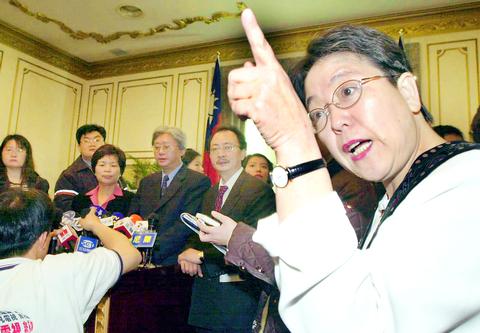Opposition lawmakers yesterday blocked a DPP attempt to make the enactment of a referendum law a priority issue on the legislative agenda.
The opposition fears that a plan to hold a referendum during the year-end legislative race has become a DPP tactic to drag out the Fourth Nuclear Power Plant (

PHOTO: CHIANG YING-YING, TAIPEI TIMES
Legislative Yuan speaker Wang Jin-pyng (王金平), who hosted yesterday's inter-party negotiations, said the opposition unanimously concluded that the law should follow due legislative process like any other, which means that substantive negotiations should be conducted before it is submitted to the legislature for final consideration.
"We are not going to single out the referendum law. All pieces of legislation get equal treatment. A bill can move on to the legislature when negotiations are complete," Wang said.
Following the Executive Yuan's announcement on Wednesday to resume the plant's construction, the opposition yesterday reopened the door to negotiations with the DPP, and the two parties held their first round of dialogue in more than three months.
The main purpose of yesterday's discussion was to arrange the agenda for the first meeting of the session on Feb. 20, when Premier Chang Chun-hsiung (張俊雄) will give the Cabinet's biannual policy address to the legislature. The legislature had refused to let Chang make the address last October, in protest over the Cabinet's decision to scrap the Fourth Nuclear Power Plant project.
But just as the tensions between the ruling and opposition parties are calming down, the referendum law is triggering a new conflict.
Opposition legislators considered the proposal by convener of the DPP legislative caucus Chou Po-lun (周伯倫) to prioritize the referendum law as a crude attempt to secure the support of anti-nuclear voters in the year-end election.
"We don't wish to see any political party use inter-party negotiations or even the legislature as a theater to vie for the year-end elections," said Hsieh Chi-ta (
A total of eight proposals for the referendum law, raised by different legislators, are now available in the legislature, some of which have finished a preliminary review. The Executive Yuan has so far not submitted any proposal to the legislature.
The opposition insisted that the referendum law should not be linked to the Fourth Nuclear Power Plant project, saying that otherwise political instability would continue.
"The referendum law should only apply to a public policy that has not been implemented. A project that is already underway, such as the Fourth Nuclear Power Plant, cannot be scrapped arbitrarily," KMT caucus whip Cheng Yung-chin (
Shen Chih-Hwei (沈智慧), deputy convener of the People First Party caucus, said the DPP should stop arguing about the power plant and focus its strength on revitalizing the nation's economy and improving the unemployment situation.
"With the dispute over the Fourth Nuclear Power Plant just concluded, [the DPP] is now trying other ways to ... provoke combat. We don't want to see this happen, nor do the people," Shen said.

MAKING WAVES: China’s maritime militia could become a nontraditional threat in war, clogging up shipping lanes to prevent US or Japanese intervention, a report said About 1,900 Chinese ships flying flags of convenience and fishing vessels that participated in China’s military exercises around Taiwan last month and in January last year have been listed for monitoring, Coast Guard Administration (CGA) Deputy Director-General Hsieh Ching-chin (謝慶欽) said yesterday. Following amendments to the Commercial Port Act (商港法) and the Law of Ships (船舶法) last month, the CGA can designate possible berthing areas or deny ports of call for vessels suspected of loitering around areas where undersea cables can be accessed, Oceans Affairs Council Minister Kuan Bi-ling (管碧玲) said. The list of suspected ships, originally 300, had risen to about

DAREDEVIL: Honnold said it had always been a dream of his to climb Taipei 101, while a Netflix producer said the skyscraper was ‘a real icon of this country’ US climber Alex Honnold yesterday took on Taiwan’s tallest building, becoming the first person to scale Taipei 101 without a rope, harness or safety net. Hundreds of spectators gathered at the base of the 101-story skyscraper to watch Honnold, 40, embark on his daredevil feat, which was also broadcast live on Netflix. Dressed in a red T-shirt and yellow custom-made climbing shoes, Honnold swiftly moved up the southeast face of the glass and steel building. At one point, he stepped onto a platform midway up to wave down at fans and onlookers who were taking photos. People watching from inside

Japan’s strategic alliance with the US would collapse if Tokyo were to turn away from a conflict in Taiwan, Japanese Prime Minister Sanae Takaichi said yesterday, but distanced herself from previous comments that suggested a possible military response in such an event. Takaichi expressed her latest views on a nationally broadcast TV program late on Monday, where an opposition party leader criticized her for igniting tensions with China with the earlier remarks. Ties between Japan and China have sunk to the worst level in years after Takaichi said in November that a hypothetical Chinese attack on Taiwan could bring about a Japanese

STREAMLINED: The dedicated funding would allow the US to transfer equipment to Taiwan when needed and order upgraded replacements for stockpiles, a source said The US House of Representatives on Thursday passed a defense appropriations bill totaling US$838.7 billion, of which US$1 billion is to be allocated to reinforcing security cooperation with Taiwan and US$150 million to replace defense articles provided to the nation. These are part of the Consolidated Appropriation Act, which the US House yesterday passed with 341 votes in favor and 88 against. The act must be passed by the US Senate before Friday next week to avoid another government shutdown. The US House Committee on Appropriations on Monday unveiled the act, saying that it allocates US$1 billion for the Taiwan Security Cooperation Initiative